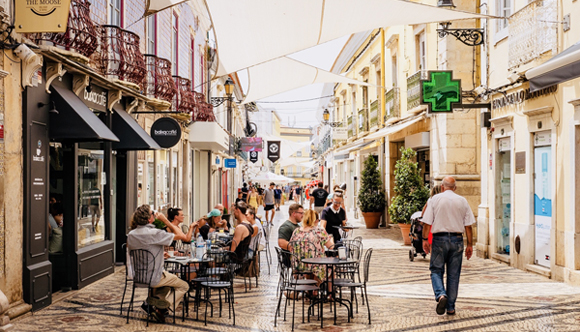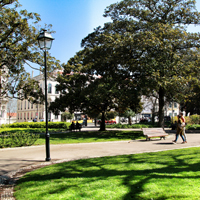Digital Nomad Life in Faro, Portugal
Summary: Cascais, Portugal is a popular destination for digital nomads due to its stunning beaches, vibrant culture, and affordable cost of living. The best neighborhood to live in Cascais is Estoril, which is known for its beautiful beaches, excellent restaurants, and vibrant nightlife. The approximate population of Cascais is 205,000. The weather in Cascais, Portugal is mild with temperatures ranging from the mid-50s to the mid-70s Fahrenheit. The monthly cost of living for a digital nomad in Cascais is approximately $1,500 USD. The cost to rent a centrally located, one-bedroom apartment with high-speed internet access in Cascais is around $1,000 USD per month.

How do I meet people in Faro?
When we asked people living in Faro about club and activities where newcomers can meet others, they responded:
"Faro, offers a variety of clubs and activities for expats to join and meet new people. Many expats join language exchange clubs, where they can practice Portuguese with locals and help them with English or other languages. There are also various sports clubs, such as golf, tennis, and sailing, which are popular among the expat community. Cultural clubs are another great way to meet people and learn about Portuguese history and traditions. These clubs often organize trips to local museums, historical sites, and cultural events. Cooking clubs are also popular, where expats can learn to prepare traditional Portuguese dishes and share their own recipes from home. In addition to joining clubs, expats often meet people through volunteering. There are numerous opportunities to volunteer in Faro, from helping out at local schools to participating in environmental conservation projects. This not only allows expats to give back to their new community, but also to meet like-minded individuals. Networking events and social gatherings are also common in Faro. These events are often organized by local businesses or expat groups and provide a relaxed setting for expats to mingle and make new friends. Furthermore, many expats meet people through their children's schools. Parent-teacher associations and school events provide opportunities for parents to get to know each other. Lastly, many expats find that simply exploring their new city and striking up conversations with locals is a great way to meet people. Whether it's at a local café, park, or market, Faro's friendly and welcoming atmosphere makes it easy for expats to make new connections," said one person in Faro.
What is life like in Faro?
When we asked people living in Faro what life is like and how people spend their time, they said:
"Life for expats and digital nomads in Faro is generally relaxed and enjoyable. The city offers a warm climate, beautiful beaches, and a rich history, making it an attractive destination for those looking to work remotely. The cost of living is relatively low compared to other European cities, making it an affordable option for many. The local community is friendly and welcoming, and there is a growing expat community. The city is also well-connected with reliable internet, making it easy for digital nomads to work. English is widely spoken, especially in the tourism industry, which makes it easier for expats to communicate and navigate their daily lives. Faro offers a variety of leisure activities, from exploring the historic old town to enjoying the local cuisine. The city is also known for its vibrant nightlife, with numerous bars and clubs. For those who enjoy outdoor activities, there are plenty of opportunities for hiking, biking, and water sports. Despite its many advantages, there can be challenges. Some expats may find the pace of life too slow, and the bureaucracy can be frustrating. It can also take time to adjust to the local culture and customs. However, most expats and digital nomads find that the benefits of living in Faro far outweigh these minor inconveniences," said one person in Faro.
Where should I live in Faro?
We asked digital nomads and expats how they chose their neighborhood and found a place to live. They answered:
"Finding a place to live in Faro involves several steps. First, you need to determine your budget and the type of accommodation you're looking for. This could range from a small apartment to a larger house, depending on your needs and financial situation. Next, you should research the different neighborhoods in Faro to find one that suits your lifestyle and preferences. Some areas might be closer to the city center, while others might be more residential or closer to the beach. Once you have a clear idea of what you're looking for, you can start your search. There are several online platforms that list properties for rent or sale in Faro, such as Idealista, OLX, or Remax Portugal. These websites allow you to filter your search based on location, price, size, and other features. In addition to online searches, you might also want to consider hiring a real estate agent. They can provide valuable local knowledge, help negotiate prices, and guide you through the legal process of renting or buying a property in Portugal. When you find a property you're interested in, arrange a viewing. This will give you a chance to inspect the property, ask questions, and get a feel for the neighborhood. If you decide to proceed with a property, you'll need to negotiate the terms of the lease or purchase agreement. This will include the price, the length of the lease (if renting), and any other conditions. Once the terms are agreed upon, you'll need to sign a contract. If you're renting, you'll also likely need to pay a deposit. Finally, once the contract is signed and the deposit is paid, you can move into your new home in Faro. Remember to set up any necessary utilities, such as electricity, water, and internet. It's also worth noting that if you're moving to Portugal from another country, you'll need to make sure you have the right visa or residency permit to live there. You may also need to open a Portuguese bank account, especially if you're planning to work or study there," explained one expat living in Faro, Portugal.
What do I need to know before moving to Faro?
When we asked people what advice they would give someone preparing to move to Faro, they said:
"Expats considering retirement in Faro should be aware of several key factors. Firstly, the cost of living in Faro is relatively low compared to other European cities, making it an attractive option for retirees. However, it's important to have a clear understanding of your financial situation and budget before making the move. The official language in Faro is Portuguese, so learning the basics of the language will be beneficial, although English is widely spoken in tourist areas. The healthcare system in Portugal is of a high standard, with both public and private options available. Expats are eligible for public healthcare if they are residents and contribute to the social security system. Faro has a Mediterranean climate, with hot summers and mild winters, which may be a significant change for those used to cooler climates. The city is known for its rich history, beautiful beaches, and golf courses, offering plenty of activities for retirees. Portugal has a favorable tax regime for foreign retirees, known as the Non-Habitual Resident (NHR) scheme. This allows for a tax exemption on foreign income, including pensions, for a period of ten years. However, it's recommended to seek advice from a tax consultant before moving. When it comes to housing, there are various options available, from renting an apartment to buying a villa. It's advisable to spend some time in Faro before deciding where to live, to get a feel for the different neighborhoods. Finally, it's important to understand the visa requirements for living in Portugal. Non-EU citizens will need to apply for a residence visa before they move, while EU citizens have the right to reside in Portugal, but must register their residence after three months," remarked one member in Faro.
 AGS Worldwide Movers
AGS Worldwide MoversGet Quote
Relocating abroad soon? Make your move with AGS! AGS Worldwide Movers is a leader in the international moving industry. Our experience and expertise allows us to guarantee our clients the best quality moving services.
 AGS Worldwide Movers
AGS Worldwide MoversRelocating abroad soon? Make your move with AGS! AGS Worldwide Movers is a leader in the international moving industry. Our experience and expertise allows us to guarantee our clients the best quality moving services.
Get Quote
What do people appreciate most about the culture in Faro?
"Expats in Faro often appreciate the relaxed and laid-back lifestyle that is a significant part of the local culture. They enjoy the warm and welcoming nature of the Portuguese people, who are known for their hospitality and friendliness. The rich history and beautiful architecture of Faro are also greatly appreciated, with many expats enjoying the opportunity to explore the city's old town and historical sites. The local cuisine is another highlight, with fresh seafood, local wines, and traditional Portuguese dishes being a favorite among expats. The local culture also places a strong emphasis on family and community, which many expats find comforting and enjoyable. The beautiful natural surroundings, including the stunning beaches and picturesque countryside, are also a big draw for expats living in Faro. Lastly, the vibrant festivals and events that take place throughout the year provide a great insight into the local culture and are something that many expats look forward to," said one expat who made the move to Faro.
What do people find most challenging about the culture in Faro?
"Expats in Faro often find the language barrier to be the most challenging aspect of the local culture, as Portuguese is the primary language spoken and not everyone speaks English. The slower pace of life can also be a challenge for those accustomed to a faster, more hectic lifestyle. Additionally, the Portuguese concept of time, which is more relaxed and less punctual than in some other cultures, can be difficult for expats to adjust to. Some expats may also struggle with the bureaucracy in Portugal, which can be complex and time-consuming. Lastly, while the Portuguese are generally friendly and welcoming, it can take time to form deep, meaningful friendships, which can be challenging for newcomers," said one person in Faro.
What residency documents or visas did I need if I will be in Faro for a while?
"If you are planning to stay in Faro for a period longer than 90 days, you will need to apply for a long-term visa or a residence permit. The type of visa or permit you need will depend on the purpose of your stay, such as work, study, or retirement. If you are a citizen of a non-EU country, you will need to apply for a visa before you arrive in Portugal. This can be done at the Portuguese embassy or consulate in your home country. You will need to provide several documents, including a valid passport, proof of sufficient funds to support yourself during your stay, and proof of accommodation in Faro. If you are a citizen of an EU country, you do not need a visa to stay in Portugal. However, if you plan to stay for longer than 90 days, you will need to register with the local city council and obtain a Certificate of Registration. You will need to provide a valid ID or passport, proof of sufficient funds, and proof of accommodation. If you plan to work in Portugal, you will need to apply for a work permit in addition to your visa. This will require a job offer from a Portuguese employer. If you plan to study in Portugal, you will need to apply for a study visa. This will require an acceptance letter from a Portuguese educational institution. If you are retiring in Portugal, you may be eligible for a passive income visa or a D7 visa. This requires proof of a stable and sufficient income. Regardless of the type of visa or permit you apply for, it's important to start the application process well in advance of your planned arrival date in Faro, as it can take several weeks or even months for applications to be processed," said one expat in Faro.
 AGS Worldwide Movers
AGS Worldwide MoversGet Quote
Relocating abroad soon? Make your move with AGS! AGS Worldwide Movers is a leader in the international moving industry. Our experience and expertise allows us to guarantee our clients the best quality moving services.
 AGS Worldwide Movers
AGS Worldwide MoversRelocating abroad soon? Make your move with AGS! AGS Worldwide Movers is a leader in the international moving industry. Our experience and expertise allows us to guarantee our clients the best quality moving services.
Get Quote
What cultural blunders should I try to avoid making in Faro?
We asked people in Faro if they could share any humorous cultural blunders they commited. They wrote:
"When visiting Faro, it's important to respect the local customs and traditions to avoid any cultural faux pas. Here are some tips: Avoid discussing politics, religion, and other sensitive topics unless you are very familiar with Portuguese culture and history. These topics can be very personal and may lead to heated debates. Don't rush your meals. In Portugal, meals are a time for relaxation and socializing. It's considered rude to rush through your meal or to leave immediately after finishing. Avoid being loud or boisterous in public places. Portuguese people are generally reserved and appreciate quiet and calm behavior. Don't expect shops and businesses to be open all day. Many businesses close for a few hours in the afternoon for a siesta. Avoid wearing beachwear or revealing clothing in the city or in churches. This is considered disrespectful. Don't forget to say "please" (por favor) and "thank you" (obrigado if you're male, obrigada if you're female). Portuguese people are polite and appreciate good manners. Avoid being overly punctual. It's common in Portugal for people to arrive a little late for social gatherings. Don't tip excessively. In Portugal, it's customary to leave a small tip, but not the 15-20% that is common in some other countries. Avoid calling the Portuguese language "Spanish" or comparing Portugal to Spain. The Portuguese are proud of their unique culture and language. Don't forget to greet people with a handshake. It's also common for close friends to greet each other with a kiss on both cheeks," remarked one foreigner who made the move to Faro.
 AGS Worldwide Movers
AGS Worldwide MoversGet Quote
Relocating abroad soon? Make your move with AGS! AGS Worldwide Movers is a leader in the international moving industry. Our experience and expertise allows us to guarantee our clients the best quality moving services.
 AGS Worldwide Movers
AGS Worldwide MoversRelocating abroad soon? Make your move with AGS! AGS Worldwide Movers is a leader in the international moving industry. Our experience and expertise allows us to guarantee our clients the best quality moving services.
Get Quote
About the Author
 Betsy Burlingame is one of the founders of Digital Nomad Exchange and the Founder and President of Expat Exchange. She launched Expat Exchange in 1997 as her Master's thesis project at NYU. Prior to Expat Exchange and Digital Nomad Exchange, Betsy worked at AT&T in International
and Mass Market Marketing. She graduated from Ohio Wesleyan University
with a BA in International Business and German.
Betsy Burlingame is one of the founders of Digital Nomad Exchange and the Founder and President of Expat Exchange. She launched Expat Exchange in 1997 as her Master's thesis project at NYU. Prior to Expat Exchange and Digital Nomad Exchange, Betsy worked at AT&T in International
and Mass Market Marketing. She graduated from Ohio Wesleyan University
with a BA in International Business and German.
Some of Betsy's articles include 12 Best Places to Live in Portugal, 7 Best Places to Live in Panama and 12 Things to Know Before Moving to the Dominican Republic. Betsy loves to travel and spend time with her family. Connect with Betsy on LinkedIn.

AGS Worldwide Movers can move you to and from anywhere in the world.
Get Quote
![]() Portugal Forum
Portugal Forum
Talk with other digital nomads and expats in Portugal on our Portugal forum - meet people, get advice and help others.
![]() Contribute
Contribute
Help others in Portugal by answering questions about the challenges and adventures of living in Portugal.
Digital Nomads in Portugal offer advice about healthcare, hospital visits, emergency rooms visits, finding a doctor and buying health insurance in Portugal.




